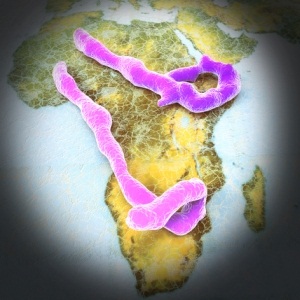
More than 22 million people live in parts of Africa where conditions exist for the Ebola virus to jump from animals to humans, a bigger area than previously thought, according to researchers.
Direct contact with body fluids
While the actual risk of animal-to-human or "zoonotic" transmission is low – there have been only 30 confirmed cases in the disease's history – the wide geographic spread boosts the potential for future human outbreaks, disease specialists wrote in the journal eLife.
People can in very rare cases contract the virus from touching or eating infected animals like bats, chimpanzees or gorillas, and then infect other people.
Read: Ebola risk from animals higher than thought
Human-on-human transmission of the haemorrhagic fever-causing virus, which has a death rate of up to 90 percent, requires direct contact with the body fluids of an infected person or corpse.
Countries that have never had a direct animal-to-human infection, but are at risk, are Angola, Burundi, Cameroon, the Central African Republic, Ethiopia, Ghana, Liberia, Madagascar, Malawi, Mozambique, Nigeria, Rwanda, Sierra Leone, Tanzania and Togo, the team reported.
Countries where cases of zoonotic transmission have been reported in the past were Congo, Democratic Republic of Congo, Gabon, Guinea, Ivory Coast, South Sudan and Uganda.
Poor healthcare infrastructure
"We have shown that the human population living within (the risk area) is larger, more mobile and better internationally connected than when the pathogen was first observed" in then-Zaire in 1976, the scientists wrote.
At-risk areas in 22 countries "are inhabited by 22 million people".
"As a result, when spillover events do occur, the likelihood of continued spread amongst the human population is greater, particularly in areas with poor healthcare infrastructure."
The current Ebola outbreak, the biggest in the disease's 40-year history, has killed more than 2,000 people out of nearly 4,000 infected in West Africa from December last year to August 31, according to the UN's World Health Organisation (WHO).
Read: Wealthy countries must help to halt Ebola
The current outbreak emerged in Guinea, from where it spread to Liberia, Sierra Leone and Nigeria, said the study authors, adding the frequency of Ebola outbreaks appears to have increased since 2000.
They urged stricter surveillance, including the testing of bats in high-risk countries, where they act as virus reservoirs.
"The increasing connectedness of the African region means that EVD (Ebola virus disease) is now a problem of international concern," they warned, while stressing an outbreak remained unlikely in western countries with functioning health systems.
Read more:
Guinea issues bushmeat warning after Ebola outbreak
Fear hampers fight against Ebola in West Africa
Ebola survivors can infect others with their sperm
Image: Ebola virus from Shutterstock




 Publications
Publications
 Partners
Partners














